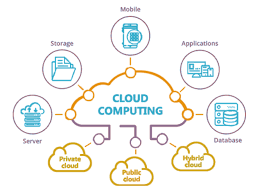Maximizing Business Potential: Leveraging IT Services and Consulting for Success
The Importance of IT Services and IT Consulting
Information Technology (IT) has become an integral part of modern businesses, playing a crucial role in their operations and success. IT services and IT consulting are essential components that help organizations leverage technology effectively to achieve their goals.
IT Services
IT services encompass a broad range of activities aimed at managing, maintaining, and optimizing an organization’s IT infrastructure. This includes services such as network management, cybersecurity, cloud solutions, software development, and technical support.
By outsourcing IT services to experienced professionals, businesses can benefit from enhanced security, improved efficiency, reduced downtime, and access to specialized expertise. This allows organizations to focus on their core business activities while ensuring that their IT systems operate smoothly and securely.
IT Consulting
IT consulting involves providing expert advice and guidance on how to best utilize technology to meet business objectives. Consultants work closely with organizations to assess their current IT environment, identify areas for improvement, develop strategic plans, and implement solutions that align with the company’s goals.
Whether it’s optimizing existing systems, implementing new technologies, or addressing specific challenges, IT consultants bring a wealth of knowledge and experience to help businesses make informed decisions that drive growth and innovation.
The Benefits of IT Services and Consulting
- Increased Efficiency: By streamlining processes and optimizing systems, businesses can operate more efficiently and effectively.
- Enhanced Security: With the rise of cyber threats, robust cybersecurity measures are essential to protect sensitive data and prevent breaches.
- Strategic Planning: IT consulting helps organizations develop long-term strategies that align technology with business objectives for sustainable growth.
- Cutting-Edge Solutions: Accessing the latest technologies through IT services ensures that businesses remain competitive in a rapidly evolving digital landscape.
- Cost Savings: Outsourcing IT services can be cost-effective compared to maintaining an in-house IT department while providing access to top-tier expertise.
In conclusion, investing in quality IT services and consulting is vital for organizations looking to harness the power of technology for success. By partnering with experienced professionals who understand the complexities of modern IT environments, businesses can navigate challenges effectively and unlock new opportunities for growth.
Top 7 Benefits of IT Services and Consulting: Security, Expertise, Efficiency, and More
- Enhanced security measures to protect sensitive data
- Access to specialized expertise and technical knowledge
- Improved efficiency through streamlined IT processes
- Cost-effective solutions compared to maintaining an in-house IT department
- Strategic planning for aligning technology with business objectives
- Cutting-edge technologies and innovative solutions
- 24/7 technical support for immediate assistance
7 Drawbacks of IT Services and Consulting: Challenges for Businesses
- Costly, especially for small businesses with limited budgets
- Dependency on external service providers can lead to delays in resolving IT issues
- Risk of data breaches or security vulnerabilities if not properly managed
- Potential for misalignment between IT solutions and business goals without thorough consultation
- Difficulty in finding reliable and trustworthy IT service providers
- Complexity in integrating new technologies with existing systems may cause disruptions
- Lack of in-house expertise can result in challenges when managing outsourced IT services
Enhanced security measures to protect sensitive data
In today’s digital landscape, one of the key benefits of IT services and IT consulting is the implementation of enhanced security measures to safeguard sensitive data. With the increasing frequency and sophistication of cyber threats, organizations face significant risks if their data is not adequately protected. By leveraging IT services and consulting expertise, businesses can fortify their systems with robust cybersecurity protocols, encryption methods, access controls, and proactive monitoring to mitigate the risk of data breaches and unauthorized access. This proactive approach not only protects valuable information but also instills trust among customers and stakeholders, demonstrating a commitment to data privacy and security.
Access to specialized expertise and technical knowledge
Access to specialized expertise and technical knowledge is a significant advantage of IT services and IT consulting. By partnering with professionals who possess in-depth knowledge of the latest technologies and industry best practices, businesses can tap into a wealth of expertise that may not be available internally. These experts bring specialized skills to the table, offering innovative solutions, strategic insights, and efficient problem-solving capabilities. Their technical know-how enables organizations to implement cutting-edge technologies, optimize systems for peak performance, and stay ahead of the curve in a rapidly evolving digital landscape. Ultimately, leveraging this specialized expertise through IT services and consulting can drive business growth, enhance operational efficiency, and ensure long-term success in an increasingly technology-driven world.
Improved efficiency through streamlined IT processes
Improved efficiency through streamlined IT processes is a significant benefit of IT services and consulting. By optimizing and automating IT workflows, businesses can eliminate redundancies, reduce manual errors, and accelerate task completion. This streamlined approach not only saves time but also enhances overall productivity, allowing employees to focus on more strategic initiatives rather than mundane tasks. With efficient IT processes in place, organizations can operate smoothly, respond to challenges swiftly, and stay competitive in today’s fast-paced business environment.
Cost-effective solutions compared to maintaining an in-house IT department
One significant advantage of IT services and IT consulting is the cost-effectiveness they offer compared to maintaining an in-house IT department. Outsourcing IT services allows businesses to access top-tier expertise and specialized skills without the overhead costs associated with hiring and training full-time IT staff. By partnering with external providers, organizations can benefit from tailored solutions that meet their specific needs while also reducing operational expenses. This cost-effective approach enables companies to allocate resources more efficiently, focus on core business activities, and achieve a higher return on investment in their IT infrastructure.
Strategic planning for aligning technology with business objectives
Strategic planning for aligning technology with business objectives is a key benefit of IT services and consulting. By working closely with experienced IT professionals, organizations can develop long-term strategies that ensure technology investments support and enhance their overall business goals. This alignment helps businesses stay competitive, adapt to changing market conditions, and drive innovation through the effective use of technology resources. IT services and consulting play a crucial role in guiding companies towards sustainable growth by ensuring that their technological initiatives are in harmony with their strategic vision.
Cutting-edge technologies and innovative solutions
Cutting-edge technologies and innovative solutions are key benefits of IT services and consulting. By leveraging the latest advancements in technology, businesses can stay ahead of the curve and adapt to the rapidly changing digital landscape. IT professionals bring expertise in implementing innovative solutions that enhance efficiency, productivity, and competitiveness. Whether it’s adopting cloud computing, integrating AI-driven systems, or developing custom software applications, embracing cutting-edge technologies through IT services and consulting enables organizations to drive growth, improve customer experiences, and achieve strategic objectives effectively.
24/7 technical support for immediate assistance
Having access to 24/7 technical support through IT services and consulting is a significant advantage for businesses. Immediate assistance ensures that any IT issues or emergencies can be addressed promptly, minimizing downtime and potential disruptions to operations. Whether it’s a network outage, cybersecurity incident, or software malfunction, knowing that expert support is available round the clock provides peace of mind and allows businesses to maintain continuity and productivity at all times.
Costly, especially for small businesses with limited budgets
Implementing IT services and consulting can be a significant challenge for small businesses with constrained budgets. The costs associated with hiring external IT experts or investing in advanced technology solutions can quickly add up, making it a financial burden for smaller enterprises. Limited financial resources may force small businesses to prioritize other operational expenses over IT enhancements, potentially hindering their ability to compete effectively in the digital landscape. Finding cost-effective ways to access essential IT services and consulting expertise becomes crucial for small businesses aiming to leverage technology for growth while managing their financial constraints efficiently.
Dependency on external service providers can lead to delays in resolving IT issues
Dependency on external service providers for IT services and consulting can pose a significant con as it may result in delays in resolving IT issues. Relying on third-party vendors means that businesses are subject to the provider’s availability and response times, which could lead to prolonged downtime and disruptions in operations. In situations where immediate assistance is required, waiting for external support can hinder productivity and impact overall business performance. Therefore, organizations should carefully consider the potential drawbacks of outsourcing IT services to mitigate the risk of delays in addressing critical IT issues.
Risk of data breaches or security vulnerabilities if not properly managed
In the realm of IT services and IT consulting, one significant concern is the potential risk of data breaches or security vulnerabilities if not properly managed. In today’s digital landscape, where sensitive information is constantly being exchanged and stored, inadequate security measures can leave organizations vulnerable to cyber threats. Failure to address these risks proactively can result in costly data breaches, compromised systems, and damage to a company’s reputation. It is crucial for businesses to prioritize robust cybersecurity practices and enlist the expertise of professionals to mitigate these risks effectively and safeguard their valuable data assets.
Potential for misalignment between IT solutions and business goals without thorough consultation
One significant con of IT services and IT consulting is the potential for misalignment between IT solutions and business goals when thorough consultation is lacking. Without a comprehensive understanding of the organization’s objectives and operational needs, IT solutions may not effectively address key business challenges or support strategic initiatives. This misalignment can lead to wasted resources, inefficiencies in technology implementation, and missed opportunities for leveraging technology to drive business growth. Therefore, it is crucial for businesses to prioritize thorough consultation with IT experts to ensure that the solutions implemented align closely with their specific goals and requirements.
Difficulty in finding reliable and trustworthy IT service providers
In the realm of IT services and consulting, a significant challenge that organizations often face is the difficulty in finding reliable and trustworthy service providers. With the increasing complexity of technology and the ever-evolving landscape of cybersecurity threats, businesses must carefully vet potential IT partners to ensure they have the expertise and integrity needed to safeguard their systems and data. The consequences of engaging with unreliable IT service providers can range from subpar performance and costly downtime to serious security breaches that jeopardize the organization’s reputation and bottom line. Therefore, thorough research, references, and due diligence are essential steps in selecting a dependable IT partner that can deliver quality services and peace of mind.
Complexity in integrating new technologies with existing systems may cause disruptions
The complexity involved in integrating new technologies with existing systems can present a significant challenge for organizations utilizing IT services and consulting. This con may lead to disruptions in operations, as the compatibility issues and technical intricacies of merging different systems can result in downtime, data loss, or performance issues. Careful planning, thorough testing, and expert guidance from IT consultants are essential to mitigate these risks and ensure a smooth transition when implementing new technologies within an organization’s infrastructure.
Lack of in-house expertise can result in challenges when managing outsourced IT services
Outsourcing IT services and consulting can present a challenge when organizations lack in-house expertise to effectively manage and oversee the outsourced functions. Without a deep understanding of the technologies and processes involved, businesses may struggle to communicate their needs, monitor service quality, or align outsourced IT activities with overall business objectives. This lack of internal expertise can lead to mismanaged projects, delays in problem resolution, and potential disconnect between the outsourced team and the organization’s strategic direction. To mitigate this con, businesses should consider investing in training programs for internal staff or engaging with IT consultants who can bridge the gap between external service providers and internal stakeholders.




